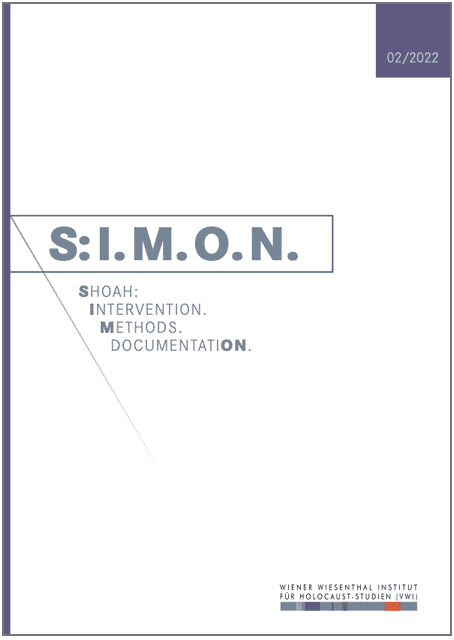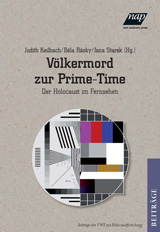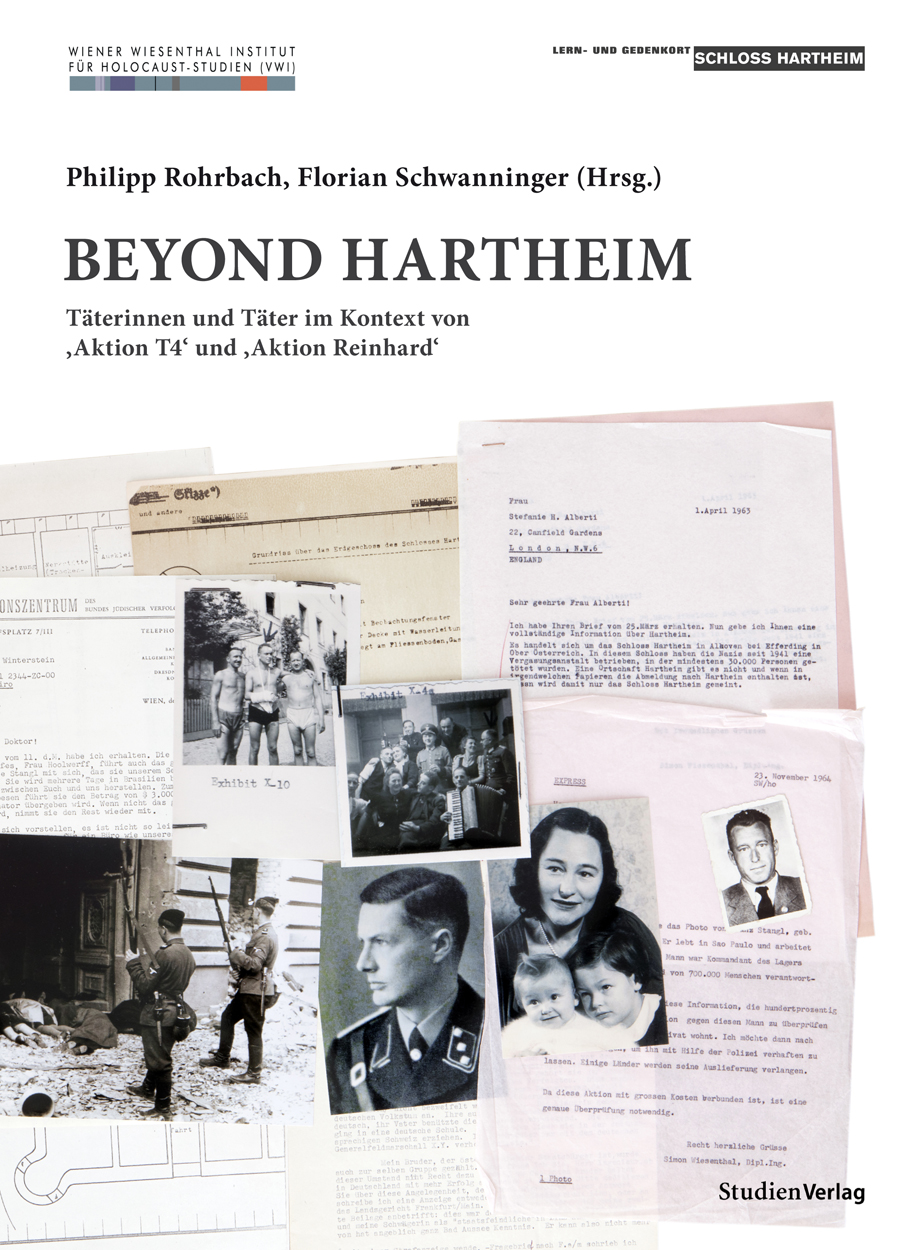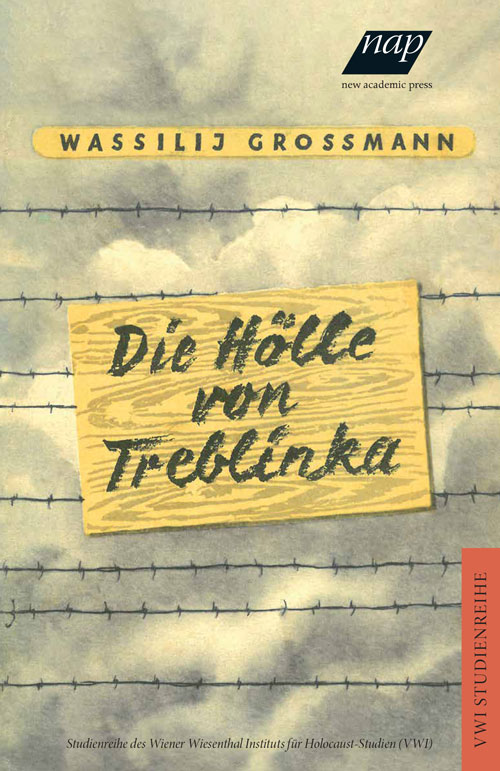News – Events – Calls
| 24. April 2024 19:00 BuchpräsentationIngeborg Bachmann, Marie Luise Kaschnitz, Hilde Domin, Nelly Sachs: Über Grenzen sprechend. Briefe. Piper/Suhrkamp, München, Berlin, Zürich 2023Ingeborg Bachmann stand mit zentralen Protagonistinnen der deutschsprachigen Literatur im Austausch, nun werden ihre Briefwechsel mit Marie Luise Kaschnitz, Hilde Domin und Nelly Sachs erstmals zugänglich gemacht. Die Briefe geben Einblick in die Lebensbedingungen, das literarische S...Weiterlesen... |
| 02. May 2024 18:30 Simon Wiesenthal LectureEdyta Gawron: Never Too Late to Remember, Never Too Late for Justice! Holocaust Research and Commemoration in Contemporary PolandIn 1994, Simon Wiesenthal received a doctorate honoris causa from the Jagiellonian University in Krakow for his lifelong quest for justice – half a century after he had been, for a short time, prisoner of the local Nazi Concentration Camp (KL) Plaszow. The 1990s were the decade when t...Weiterlesen... |
| 07. May 2024 00:00 - 04. June 2024 00:00 WorkshopDealing with Antisemitism in the Past and Present. Scientific Organisations and the State of Research in AustriaThis series of talks, presented by antisemitism experts from different organisations that research antisemitism using a variety of academic approaches, aims to provide a snapshot of historical evolutions, current events, prevalent perceptions and declared (and undeclared) attitudes. I...Weiterlesen... |
| 14. May 2024 08:45 - 16. May 2024 16:30 TagungQuantifying the Holocaust. Classifying, Counting, Modeling: What Contribution to Holocaust History? About the conference: https://quantiholocaust.sciencesconf.org/ Programme timed on the basis of 15-minute presentations + 15-minute discussions; short breaks and lunches Day 1 Tuesday, 14 May 2024Centre Malher (9 rue Malher 75004 Paris/amphi Dupuis) From 8.45 am: Welcome9.30 am...Weiterlesen... |
| 24. May 2024 18:00 InterventionLange Nacht der Forschung 20242024 öffnet das Wiener Wiesenthal Institut für Holocaust-Studien (VWI) in der Langen Nacht der Forschung wieder seine Tore und lädt Interessierte in seine Räumlichkeiten am Rabensteig 3 ein. Im Rahmen von Vorträgen, Podiumsdiskussionen und Präsentationen bieten VWI-Team und Gäste Einb...Weiterlesen... |
| 04. June 2024 13:00 VWI invites/goes to...Workshop: Social History of the Shoah. Everyday Life, Space and Time VWI invites Institut für Zeitgeschichte, Universität Wien 13:00Hannah Riedler (VWI Junior Fellow)Between Deportation, Forced Labour and Germanisation. The Umwandererzentralstelle in Occupied Poland 1939–1941Commented by Kerstin von Lingen 13:40Jenny Watson (VWI Research Fell...Weiterlesen... |
The consortium EHRI-AT
The European Holocaust Research Infrastructure (EHRI) European Holocaust Research Infrastructure (EHRI) is an international infrastructure that supports and promotes Holocaust research, commemoration and education on a transnational level. EHRI-AT is the national node representing the Republic of Austria within this international research consortium. The national consortium is coordinated by the Vienna Wiesenthal Institute for Holocaust Studies (VWI).
EHRI-AT will seek to ensure the long-term sustainability of Holocaust research within Austria and beyond by:
- representing institutions in Austria working in the field of documentation, commemoration and research on the Holocaust to establish and develop a strong research consortium;
- exchanging and sharing expertise on digital developments and connecting resources through a state-of-the-art digital infrastructure;
- disseminating, implementing and developing innovative digital research tools;
- offering fellowships and training opportunities for researchers, archivists and heritage professionals.
The partner institutions in EHRI-AT are:
- Center for Jewish Studies at the University of Graz (CJS)
- Documentation Centre of Austrian Resistance (DÖW)
- OeAD (Programm ERINNERN:AT)
- Institute for Jewish History in Austria (Injoest)
- Place for Learning and Remembrance Schloss Hartheim (LGSH)
- University of Innsbruck (LFU)
- National Funds of the Republic of Austria for Victims of National Socialism (Nationalfonds)
- Vienna Wiesenthal Institute for Holocaust Studies (VWI)
EHRI’s impact is primarily scientific; however, the infrastructure also pursues a broader social and political agenda. The recent rise of antisemitism, xenophobia and aggressive nationalisms in Europe and beyond demonstrate that Holocaust research is never a purely academic concern but a prerequisite for open and non-discriminatory societies across Europe and the world.
The EHRI portal is one of the central projects in EHRI. It is intended to provide researchers with a cross-national overview of archive material on the Holocaust. Since 2010, EHRI has identified over 2,233 archives from 63 countries and integrated information on over 37,000 collections. The need for such an infrastructure in Austria was already recognised by Simon Wiesenthal in the 1960s. He worked in Vienna with the Documentation Center of the Association of Jewish Persecutees of the Nazi Regime on a “List of Archives with Material on the Nazi Era”. The brochure was intended to support the work of courts and researchers. Lists of archives in Czechoslovakia, Israel and West Germany were compiled for this purpose.
Within the framework of EHRI-AT, the following conferences took place:
10th/11th December 2023: Holocaust Literature and Ego-Documents, Second EHRI-AT Conference of the Centre for Jewish Studies in cooperation with the Vienna Wiesenthal Institute for Holocaust Studies (VWI).
23rd/24th April 2022: Connected Histories. Memories and Narratives of the Holocaust in Digital Space, First EHRI-AT Conference hosted by the Department of Contemporary History at the University of Innsbruck and the Vienna Wiesenthal Institute for Holocaust Studies (VWI).
Research Fellowships 2022/2023 at the Vienna Wiesenthal Institute for Holocaust Studies (VWI)
The Vienna Wiesenthal Institute for Holocaust Studies (VWI) invites applications for its research fellowships for the academic year 2022/2023.
The VWI is an academic institution dedicated to the research and documentation of antisemitism, racism, nationalism and the Holocaust. Conceived and established during Simon Wiesenthal’s lifetime, the VWI receives funding from the Austrian Federal Ministry of Education, Science and Research, the Federal Chancelleryas well as the City of Vienna. Research at the Institute focuses on the Holocaust in its European context, including its antecedents and its aftermath.
Scholars who have completed their PhD studies and have produced works of scholarship are eligible for receiving a research fellowship. Research fellows will be able to conduct research on a topic of their choice in the field of Holocaust studies at the Institute. Beyond the research work itself, the stay at the Institute is intended to encourage communication and scientific exchange among the fellows at the institute. Research fellows are expected to support the Institute’s academic work and provide research adjective and support to junior fellows. Research fellows must be regularly present at the VWI.
Research projects are to focus on a topic relevant to the research interests of the VWI. Within this parameter, applicants are free to choose their own topic, approach and methodology. Fellows will have access to the archives of the Institute. It is expected that fellows will make use of relevant resources from the collection in their research projects. Research results will be the subject of formal fellow’s discussion and will be presented to the wider public at regular intervals. At the end of their stay, fellows are required to submit a research paper which will be peer-reviewed and published in VWI’s e-journal S:I.M.O.N. – Shoah: Intervention. Methods. Documentation.
Research fellowships are awarded for a duration of between five and eleven months. They will have a working space and Internet access and will receive a monthly stipend of € 2,200. In addition, VWI will cover housing costs during the fellowship (up to € 700) as well as the costs of a round-trip to and from Vienna (coach class airfare or 2nd class train fare). There is an additional one-off payment of € 500 available for research conducted outside of Vienna or photocopying costs outside of the Institute, where applicable.
Research fellows will be selected by the International Academic Advisory Board of the VWI.
Applications may be submitted in English or German and must include the following documents:
- completed application form,
- a detailed description of the research project, including the research objectives, an overview of existing research on the topic and methodology (12,000 characters max.)
- a list of publications and a CV with a photo, if not already included in application form (optional).
Please send your application in electronic format (in one integral *.pdf-file) with the subject header “VWI Research Fellowships 2022/2023” by 14 January 2022 to:
This email address is being protected from spambots. You need JavaScript enabled to view it..
If you do not get confirmation that we have received your proposal, please contact us.
Research Fellowships 2021/2022 at the Vienna Wiesenthal Institute for Holocaust Studies (VWI)
The Vienna Wiesenthal Institute for Holocaust Studies (VWI) invites applications for its research fellowships for the academic year 2021/2022.
The VWI is an academic institution dedicated to the research and documentation of antisemitism, racism, nationalism and the Holocaust. Conceived and established during Simon Wiesenthal’s lifetime, the VWI receives funding from the Austrian Federal Ministry of Education, Science and Research, the Federal Chancellery as well as the City of Vienna. Research at the institute focuses on the Holocaust in its European context, including its antecedents and its aftermath. Furthermore we encourage researchers from the field of Digital Humanities working on holocaust-relevant topics to submit their application.
Scholars who have completed their PhD studies and have produced works of scholarship are eligible for receiving a Research Fellowship. Research Fellows will be able to conduct research on a topic of their choice in the field of Holocaust studies at the institute. Beyond the research work itself, the stay at the institute is intended to encourage communication and scientific exchange among the fellows at the institute. Research Fellows are expected to support the institute’s academic work and provide research adjective and support to junior fellows. Research fellows must be regularly present at the VWI.
Research projects are to focus on a topic relevant to the research interests of the VWI. Within this parameter, applicants are free to choose their own topic, approach and methodology. Fellows will have access to the archives of the institute. It is expected that fellows will make use of relevant resources from the collection in their research projects. Research results will be the subject of formal fellow’s discussion and will be presented to the wider public at regular intervals. At the end of their stay, fellows are required to submit a research paper which will be peer-reviewed and published in VWI’s e-journal S:I.M.O.N. – Shoah: Intervention. Methods. Documentation.
Research Fellowships are awarded for a duration of between six and eleven months. Experience tells that residences between nine and eleven months are the most productive for facilitating the research of the fellows at the VWI. They will have a workstation with computer and Internet access and will receive a monthly stipend of € 2,200. In addition, VWI will cover housing costs during the fellowship (up to € 700) as well as the costs of a round-trip to and from Vienna (coach class airfare or 2nd class train fare). There is an additional one-off payment of € 500 available for research conducted outside of Vienna or photocopying costs outside of the institute, where applicable.
Research Fellows will be selected by the International Academic Advisory Board of the VWI.
Applications may be submitted in English or German and must include the following documents:
- completed application form,
- a detailed description of the research project, including the research objectives, an overview of existing research on the topic and methodology (12,000 characters max.)
- a list of publications and a CV with a photo, if not already included in application form (optional).
Please send your application in electronic format (in one integral *.pdf-file) with the subject header “VWI Research Fellowships 2021/2022” by 27 January 20210 to:
This email address is being protected from spambots. You need JavaScript enabled to view it..
If you do not get confirmation that we have received your proposal, please contact us.
Future research fellows are advised to endeavour to finance a part of their fellowship via a stipend from the Stipendienstiftung der Republik Österreich and to submit an application to this end after they have received notification of being awarded their fellowship.
Messan Tossa
Research Fellow (3/2021 - 7/2021)
Artefacts of Holocaust Literature in the African Context
 The increasing interconnection of worlds due to the relativisation of material distance goes hand in hand with the transformation of local characteristics through global forms of representation. The virtual lack of distance leads to narratives from central worlds becoming paradigms, which then serve to explain future manifestations of analogue realities. This applies especially to the Holocaust, the literary representations of which have been used to document the Rwandan genocide. This parallelism is so trenchant that Robert Stockhammer in his book on the Rwandan genocide called this the ‘other genocide’, emphasising the unmistakable reference back to the Holocaust whenever one speaks of the Rwandan genocide.
The increasing interconnection of worlds due to the relativisation of material distance goes hand in hand with the transformation of local characteristics through global forms of representation. The virtual lack of distance leads to narratives from central worlds becoming paradigms, which then serve to explain future manifestations of analogue realities. This applies especially to the Holocaust, the literary representations of which have been used to document the Rwandan genocide. This parallelism is so trenchant that Robert Stockhammer in his book on the Rwandan genocide called this the ‘other genocide’, emphasising the unmistakable reference back to the Holocaust whenever one speaks of the Rwandan genocide.
This project questions the incorporation of poetic, aesthetic, and formal signs from Holocaust literature in fictionalisations of the Rwandan genocide.
Messan Tossa works in the State Archive of Togo and as a lecturer in the Department of German Studies at the University of Lomé. He completed his PhD in the Department of German Studies at the University of Lomé in 2014 and has previously held fellowships at German institutions such as the DAAD, the Alexander von Humboldt Stiftung, and the State Library in Berlin. He has published numerous articles as well as the monograph Friedensdiskurse in der neueren deutschsprachigen Literatur (Bern 2018).
E-Mail: This email address is being protected from spambots. You need JavaScript enabled to view it.
Calls for Papers and Announcements
The Vienna Wiesenthal Institute for Holocaust Studies (VWI) regularly organises conferences and workshops. After an open call for papers, lecturers are usually selected by a jury of experts on the given topics, in consultation with the VWI's International Academic Advisory Board. The same applies to the yearly calls for fellowships at the VWI.
These calls – like all other announcements concerning the research activities of the VWI – will be published here on this page.
Research
The Vienna Wiesenthal Institute for Holocaust Studies (VIW) is driven and inspired by research. The term “Holocaust Studies” stands for research on antisemitism, racism, and the Holocaust, including its origins and aftermath. A range of different questions, innovative methods, and the newest approaches are to be applied in this research. At the same time, fundamental questions such as the inextricable relationship between Holocaust and memory or the unique aspects of the Holocaust and their parallels to other genocides are themselves to be made the subject of research.
Research at the VWI is primarily conducted in the context of the fellowship programme. In addition, various research projects of flexible duration are housed at or supported by the VWI.
The fellowships allow early career scholars as well as experienced scholars to follow their own research interests. They work on questions and texts in a context of mutual exchange and present their research results during the course of their stay at the VWI to a small, interested professional audience as well as using their insights to contribute to current larger, international research agendas. The fellowship programme provides an opportunity to bring researchers of different ages and different research disciplines to Vienna, allowing for temporary affiliations with the VWI that will not interrupt the researchers’ academic careers. The fellows’ work is supervised by the VWI Research Programme Director, Éva Kovács.
On a second level, the VWI intends to initiate and conduct research projects in the field of Holocaust studies in close co-operation with its International Academic Advisory Board. Ideally, the fellowship research projects and the institute’s ongoing projects will mutually complement each other.
The VWI International Academic Advisory Board regularly evaluates and thus guarantees the quality of the research.










